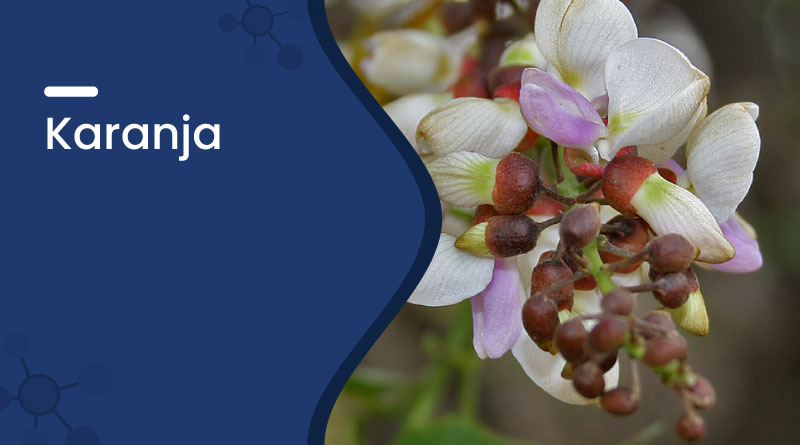Karanja – Ayurvedic Uses, Benefits, Oil Applications & Side Effects


Karanja, also known as “Indian Beech Tree” or Pongamia pinnata, is a powerful Ayurvedic herb used for its detoxifying, antimicrobial, and skin-healing properties. Traditionally, every part of the Karanja tree, especially its seeds and oil, has been utilized in classical Ayurvedic formulations to purify the blood, support skin health, and balance Kapha and Pitta doshas. Karanja is a pungent and bitter herb with heating potency, often applied both internally and externally to deal with skin disorders.
In this blog, we will explore the Ayurvedic relevance of Karanja, its major active ingredients, how it works in the body, how to use it safely, and the essential safety measures you must follow for best results.
Ayurvedic Importance of Karanja:
In Ayurveda, Karanja is highly valued for its Kaphahara (Kapha-balancing) and Krimighna (anti-parasitic) properties. It is known for drying excess moisture in the body and eliminating harmful toxins or parasites. Karanja’s bitter and pungent taste helps clear skin, reduce inflammation, and ease eczema. It is also important in Ayurvedic Panchakarma therapies, especially for skin detoxification through external oil application.
Benefits of Karanja:
- Karanja for Indigestion: It reduces bloating and makes you comfortable. It supports healthy digestion, easing discomfort and promoting a smoother digestive process. This natural aid helps your system work more efficiently.
- Karanja for Low Appetite: If you're struggling with a poor appetite, Karanja can be beneficial. It helps stimulate your digestive fire, encouraging a healthier desire to eat. This supports proper nutrient intake for overall well-being.
- Karanja for Arthritis: Managing joint pain can be tough. Karanja offers relief for arthritis discomfort, reducing inflammation and swelling. Its soothing properties help improve mobility and ease persistent aches in your joints.
- Karanja for Skin Concerns: For various skin issues, Karanja provides support. Its purifying properties help address common concerns like rashes, irritation, and dryness. It promotes healthier, clearer skin texture naturally.
- Karanja for Acne: Karanja can target acne by cleansing and purifying the skin. It helps reduce inflammation and prevent future blemishes, contributing to a clearer and healthier complexion.
- Karanja for Piles: Discomfort from piles can be significant. Karanja offers relief by reducing inflammation and promoting healing in the affected area. It helps soothe irritation and supports the body's natural recovery process.
- Karanja for Gastric Ulcer: When dealing with gastric ulcers, Karanja can provide support. It helps protect the stomach lining and reduce irritation, aiding in the healing process and making digestion healthy.
- Karanja for Wound Healing: For cuts or abrasions, Karanja supports faster healing. Its natural properties help cleanse wounds, reduce infection risk, and encourage tissue regeneration. It aids in restoring healthy skin.
Ingredients of Karanja:
Ingredients
| Ingredients | Benefits |
|---|---|
| Pongamol | Acts as an anti-inflammatory and antioxidant; protects skin and joints. |
| Karanjin | Strong antimicrobial compound; fights skin infections and parasites. |
| Flavonoids | Powerful antioxidants that reduce cellular stress and inflammation. |
| Tannins | Astringent action; dries oozing wounds and reduces skin swelling. |
| Fatty Acids (from oil) | Moisturizes skin, supports healing, and enhances absorption in topical use. |
How Karanja Works in the Body:
Karanja works by targeting imbalanced Kapha and Pitta doshas in the body. When applied externally as an oil or paste, it penetrates deep into the skin layers to remove toxins, reduce inflammation, and promote skin repair. It cleans the blood, kills worms, and boosts digestion. It has strong antibacterial and antifungal properties, making it effective against chronic skin and joint conditions.
How to Use Karanja:
Dosage Instructions:
- General Dose: As directed by an Ayurvedic practitioner.
- Form: Available as oil, powder (churna), capsules, and decoctions.
- With: Can be taken with honey for parasites or applied with coconut oil for skin conditions.
- Best Time: Morning (internally) or twice daily (topically), depending on the condition.
Safety Measures:
- Not for Pregnancy: Avoid during pregnancy and breastfeeding unless prescribed.
- Patch Test Required: Always do a skin patch test before applying Karanja oil, especially on sensitive skin.
- Not for Long-Term Use: Prolonged internal use may increase Pitta; should be monitored by a practitioner.
- Allergy Alert: Individuals with nut allergies should avoid Karanja oil unless confirmed safe.
Conclusion:
Karanja is a trusted Ayurvedic herb known for cleansing the body, fighting germs, and healing skin naturally. When used correctly, it supports both internal detox and external healing. Its rich blend of natural phytochemicals makes it a go-to remedy for skin infections, wound care, and parasitic issues. It is a strong herb, used safely under expert guidance for best results.
Frequently Asked Questions (FAQs):
Q: What is Karanja and how is it used in Ayurveda?
A: Karanja is a healing Ayurvedic herb mainly used on the skin, joints, and scalp for care and relief.
Q: Is Karanja oil safe for external application?
A: Yes, Karanja oil is safe for external use under expert advice.
Q: Are there any side effects of using Karanja?
A: No side effects are seen generally. In a few people, mild skin irritation can occur.
Q: Is Karanja beneficial for joint pain or arthritis?
A: Yes, Karanja oil helps reduce joint pain, swelling, and stiffness when massaged regularly.
Q: Can pregnant or breastfeeding women use Karanja products?
A: Not recommended for use during pregnancy or breastfeeding without medical advice due to strong properties.
Q: How often should Karanja oil be applied to the skin?
A: It can be applied once daily or as directed by an Ayurvedic practitioner for best results.
Q: Is Karanja suitable for people with sensitive skin?
A: For skin-sensitive individuals, use it cautiously and under medical advice.
Q: Does Karanja help with dandruff and scalp infections?
A: Yes, it treats scalp infections and itching due to its antifungal and antimicrobial properties.
Recent Blogs
Disclaimer : Zeelab Pharmacy provides health information for knowledge only. Do not self-medicate. Always consult a qualified doctor before starting, stopping, or changing any medicine or treatment.
















 Added!
Added!